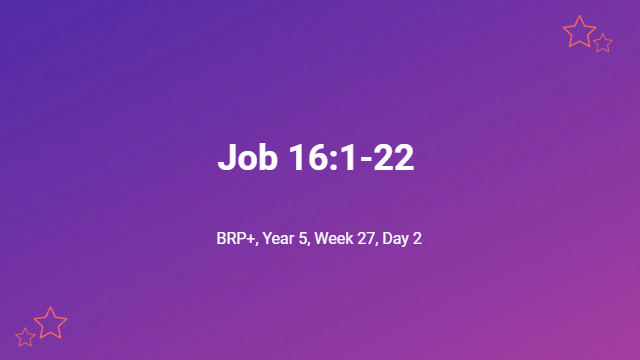Job 16:1-22
Q.1. How did the comments of his friends affect Job? What lesson did Job want his critics to understand about responding to suffering? – (Job 16:1-5)
Job was left without comfort, in spite of all the attempts by his friends to explain his plight, as they apportioned blame for his suffering. He wanted them to acknowledge that there is a world of difference between theory and practice – I too could speak like you if I were in your place. I could compose words against you and shake my head at you (Job 16:4). However, now that he had experienced such affliction, Job would approach a suffering person very differently from the way they were treating him – I could strengthen you with my mouth, and the solace of my lips could lessen your pain (Job 16:5). People who suffer will find more comfort from someone who has experienced similar pain.
Q.2. Where did Job see God in all his suffering? What aspect of Job’s suffering pointed to Christ’s abandonment by God? – (Job 16:6-17 c.f. Jn.18:22; 19:3)
Job had concluded that his terrible suffering was from the hand of God. This highlighted the inner anguish that we can go through when we face the reality that God remains in sovereign control over suffering, and in His love for us, still allows us to suffer at times. These two truths are hard to reconcile. In documenting these thoughts, Job’s words were Messianic, and pointed to the suffering of the Saviour. What he described was doubtless in the mind of Jesus – 7 … He has exhausted me; You have laid waste all my company.10… They have slapped me on the cheek with contempt; They have massed themselves against me.11 “God hands me over to ruffians and tosses me into the hands of the wicked (Job 16:7, 10-11). No one better fulfilled Job’s contention that – 7 “His anger has torn me and hunted me down, He has gnashed at me with His teeth … 16 “My face is flushed from weeping, and deep darkness is on my eyelids. 17 Although there is no violence in my hands, and my prayer is pure (Job 16:7, 16-17 c.f. Is.53:10; Mt.27:46). All these thoughts would have been in the mind of our suffering Saviour.
Q.3. What comfort did Job find in people? Did Job dismiss God’s sovereign control over his life? – (Job 16:18-22 c.f. 1 Jn. 2:1)
Job found no comfort in his friends. They scoffed at his claims that he was suffering as a righteous man (Job 16:20-21). Had Job lost all hope? Not at all. For he declared – Even now, behold, my witness is in heaven, and my advocate is on high (Job 16:19 c.f. 1 Jn.2:1).

